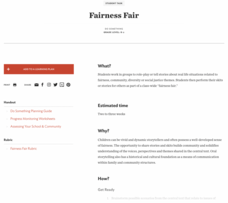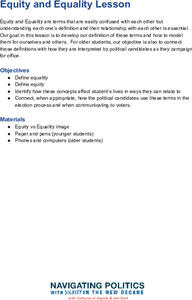Canadian Civil Liberties Education Trust
That’s Not Fair!
As part of a series of critical thinking exercises, kids consider issues of social justice, especially the factors that must be considered when trying to balance conflicting rights and freedoms.
Teaching Tolerance
Fairness Fair
How can we create a more fair world? Chances are, class members have some ideas! After reading a text about fairness, individuals create skits around the ideas of fairness. Extend the learning and make their presentations a...
Curated OER
What is Justice?
Eighth graders discuss justice and fairness. In this equitable treatment of others lesson, 8th graders say the Pledge of Allegiance and read a passage from a blog. Students discuss the terms: fair, just, and equitable.
Teaching Tolerance
Racial Disparity in the Criminal Justice System
Explore the impact of the war on drugs in a thought-provoking lesson for high school academics. Young historians delve into the world of the criminal justice system and the racial disparity that occurs in the US. The resource provides...
Curated OER
Justice, Is it Fair?
Fifth graders investigate conflict resolution through the study of justice. For this justice lesson, 5th graders are put in scenarios of unfair conditions. Students discuss the unfair situations and their feelings about them. Students...
DocsTeach
Analyzing a Letter from Jackie Robinson: "Fair Play and Justice"
Jackie Robinson was more than a baseball legend; he was an activist, too. An interesting resource explores Robinson's time in the military using primary sources. Scholars examine the racially inspired event that led to a court martial...
Judicial Learning Center
The Constitution
Supreme Court justices debate the meaning of the US Constitution, but we expect teachers to explain it to scholars with far less training and experience. A daunting task for sure, but it's not insurmountable with resources that simplify...
Judicial Learning Center
Judicial Independence
Most people support the idea of an independent judiciary in theory until they hear about a court case that violates their principles. An informative resource explains why the concept is important. It also provides scholars of criminology...
Center for History Education
Cold War Case Files: The Rosenberg Trial - Was Justice Fairly Served?
The Rosenbergs—executed for their role in a Soviet-era spy ring—continue the captivate the American imagination. Using a history lab format, young historians examine the trove of documents associated with the case, including photographs...
Judicial Learning Center
Your 4th Amendment Rights
Americans love to learn about their rights, especially those that protect them from the government's power to invade their privacy. Young people are especially engaged by this topic. An informative lesson explores four Supreme Court...
iCivics
We The Jury
A jury must decide: are the names of two businesses so similar that one is hurt by customer confusion? Learners play the role of a juror who must decide—and convince others—whether Trio Taco and Trio Pizza are too similar. Using...
Prindle Institute for Ethics
My Dream of Martin Luther King
Conduct a book study of the story, My Dream of Martin Luther King by Faith Ringgold. Followng a read-aloud, scholars take part in philosophical discussions covering the topics of freedom, equality, race, and heroes.
Judicial Learning Center
Levels of the Federal Courts
The Supreme Court gets all the glory, but very few federal cases make it to the highest court. An interesting lesson explores the structure of the lower levels of the federal court system. In addition to outlining the organization of...
Curated OER
American Political Culture
Examine American political culture with your scholars using this self-assessment lesson plan. Individuals rate a list of 14 values from highest to lowest, including ideas such as financial security, right to private property, justice,...
Judicial Learning Center
Types of Court Cases
How can one court acquit someone of a crime, while another convicts the person of the same one? It's all because of the differences between civil and criminal trials. An informative resource provides scholars in the field of criminology...
Judicial Learning Center
Getting Ready for Trial
A courtroom can be a scary place for the uninitiated. Get familiar with the process using a helpful overview of the activities that take place prior to both civil and criminal cases. The lesson explains the differences between civil and...
Judicial Learning Center
Your Day in Court
Whether out of choice or necessity, people want to know what will happen on a typical day in court. A helpful lesson walks scholars in the field of criminology through the trial process from opening statements to the final verdict.
Judicial Learning Center
The Judge and the Jury
Unless you are a lawyer, you might not understand just how unrealistic Law and Order and other legal dramas actually are. Here's a great resource to help scholars of criminology gain a more realistic perspective. The lesson outlines the...
Cultures of Dignity
Equity and Equality Lesson
Equality does not equal equity and this lesson explains why. Class members compare two images--one labeled "Equality" and the other "Equity." Using the provided discussion questions, they then develop definitions that distinguish between...
Curated OER
Relationships, Rules, and Responsibilities
First graders identify jobs in the environment. In this social justice lesson, 1st graders describe rules to protect the environment and the roles specific jobs play. Students construct environmental rules for an imaginary town.
Curated OER
Heroes
Learners explore heroism. In this character development and Holocaust lesson, students generate adjectives that describe familiar heroes. Learners view a video clip that includes testimonies of Holocaust survivors, and compare the hero...
Shell Education
A Tribute To Dr. Martin Luther King Jr.
How much do your learners know about Dr. Martin Luther King Jr.? Set up an opportunity for kids to learn about Dr. King while practicing reading fluency with a reader's theater activity. The script is for four voices and includes...
Anti-Defamation League
Martin Luther King, Jr. and Civil Rights
How far have we come and how far do we still need to go to achieve equality and full civil rights in the United States? Include a packet of materials collected in your observance of Martin Luther King, Jr. Day.
Teaching Tolerance
Community Spotlight Cards
Not all heroes wear capes—or cleats. Class members identify unsung heroes in their schools or towns for interviews, then create trading cards. A celebration including presentations or trading of cards completes their investigation of...

























